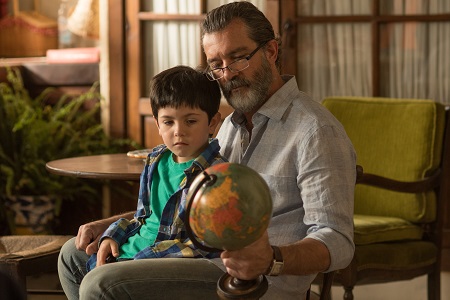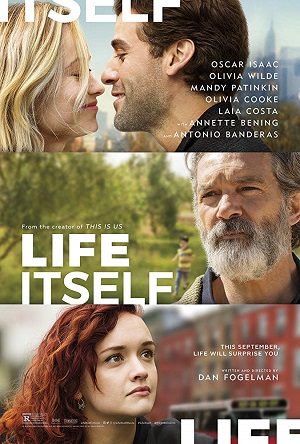
Murderously Facile Life Itself a Torturous Melodrama
Life Itself isn’t very good. Writer/director Dan Fogelman (Tangled, Crazy Stupid Love) has delivered a massive star-studded melodrama that’s relentlessly cruel, unbelievably cloying, unabashedly sentimental and frustratingly facile. In an attempt to flesh out a sprawling, universal story of life’s byzantine mysteries which includes healthy helpings of tragedy, regret, heartache and grief to go along with its depictions of family, romance, joy and selfless magnanimity, Fogelman forgets to ground his emotional smorgasbord in anything resembling reality. Instead, he’s made a movie that’s impossible to enjoy even during the portions of the story that do in fact work, the finished feature a disastrous misfire that easily ranks as one of 2018’s most head-scratching disappointments.
The most unfortunate aspect to all of this is that there are sequences of the film that do work. Most notably, there is entire subplot devoted to life on an olive farm in Andalusia lorded over by the mysterious Mr. Saccione (Antonio Banderas) who ends up taking a special interest in the life of his kind-hearted plantation manager Javier’s (Sergio Peris- Mencheta) wife Isabelle (Laia Costa) and son Rodrigo (Adrian Marrero). It is the only section of the film that feels grounded in a recognizable environment, each character an intriguing conundrum of human fallacy and dauntless courage that is extremely easy to relate to. Featuring a sensational performance from Banderas that’s continually fascinating, I was drawn into this portion of the story in a way that honestly made me wish Fogelman had just made a film about these four and excised the rest of this disjointed mélange altogether.
But even this chapter of the tale ends up falling far short of its potential. Fogelman doesn’t even attempt to conceal how these characters will end up becoming acquainted with the various New Yorkers we’re introduced to during the first two-thirds of the movie. In fact, it’s almost as if he is celebrating the gigantic coincidences required to bring them all into contact with one another. It’s almost insulting how all of this fits together, that last scenes obnoxious in their mawkish self-indulgence. For all intents and purposes it is like the director is perfectly content to shoot himself in the foot over and over again for almost the entire 118 minute running time, and for the life of me I can’t seem to figure out who he thought would find any of this intriguing let alone worth watching in the first place.
Split into a series of various chapters chronicling individual characters and/or couples at any one time, the movie attempts to cover roughly 21 years of life split between New York and that Spanish olive farm. One story focuses on married couple Will (Oscar Isaac) Abby (Olivia Wilde), while another concerns their daughter, Dylan (Olivia Cooke) and her relationship with her grandfather, Irwin (Mandy Patinkin). There’s a piece that follows Will by himself as he chats about what’s going on inside his head with his court-mandated psychiatrist Dr. Morris (Annette Bening), the two having an elongated session where comforting fiction gives way to tragic reality. The climactic section concerns itself with a new college-aged Rodrigo (Àlex Monner), the young man heading across the ocean to attend school at NYU only to end up encountering someone directly tied to a terrifying family vacation that irrevocably scarred him over a decade prior.
For a movie where 21 years splash by in the blink of an eye, it’s impossible to know when exactly Fogelman is staging any of this nonsense. Considering Will and Abby’s fondness for 1990s cinema (Pulp Fiction, Beautiful Girls and The Professional are all directly referenced), one can assume their romance and marriage takes place during that decade. But other than some Halloween costumes, the clothing, makeup styles and production design look decidedly modern. If that were the case, though, that would mean Dylan and Rodrigo’s respective stories would be taking place sometime in the future. Yet things still look the same, almost as if everyone involved in this tale was frozen in some sort of time loop, making this just another element that shatters any chance the film might have had to be grounded in anything resembling a realistic milieu.
Yet that isn’t the big problem. That is Fogelman’s sprawling, disjointed script. While he’s trying to show how life’s myriad of possibilities, positive, negative and all areas in-between, help shape who we are as human beings in ways we barely comprehend, instead all the filmmaker does is craft a relentlessly cruel drama that seems more interested in showcasing heartlessly exploitive melodramatic coincidences than it is in doing anything remotely substantive. It maims, kills, bruises and batters its characters with the determination of a psychopathic serial killer, “life” in Fogelman’s world nothing more than an invisible Michael Myers callously slaughtering metaphorical babysitters.
I don’t want to sound like the film is a total loss. The Andalusia section really is quite good at times, and both Banderas and Costa are exceptional. Wilde, too, gives a rather strong performance, and if her character wasn’t so poorly treated by the material there’s a good chance I’d have been willing to forgive Fogelman’s opus for at least a few of its more egregious missteps. But I just can’t do it. This movie slams the viewer against the pavement time and time again almost as if doing so were an Olympic sport. As I’ve already stated, Life Itself isn’t very good, and unlike the longwinded Fogelman I’ve got nothing more to add.
Film Rating: 1½ (out of 4)








